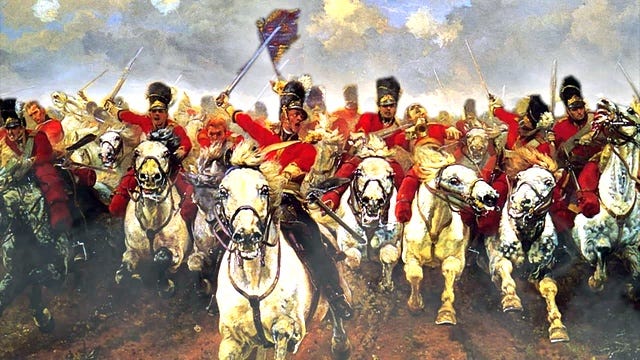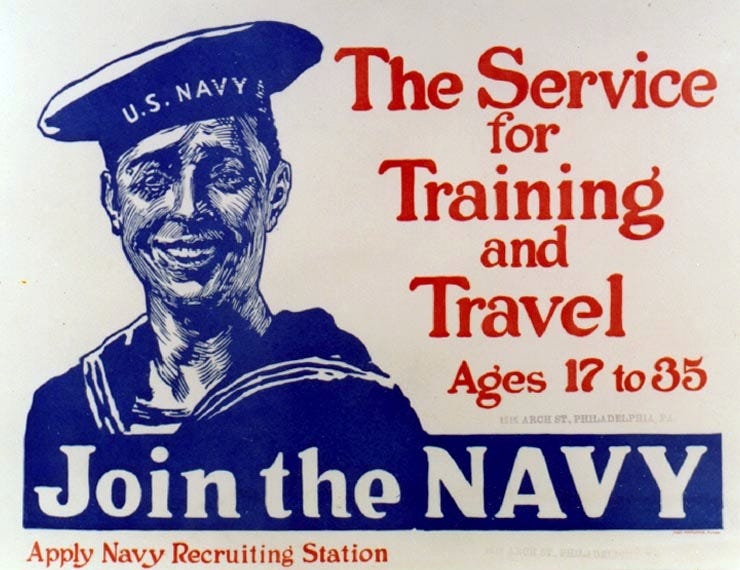The past couple of articles have been about how we can engineer a democracy which allows most people to take little to do with the running of their country (or other group), but which at the same time allows their opinions to count on every issue. We call it panocracy.
This time we're looking at one of the oldest professions, the military, and how it sits with panocratic principles.
A Recurring Temptation
“In the councils of government, we must guard against the acquisition of unwarranted influence, whether sought or unsought, by the military-industrial complex” - Dwight D. ‘Ike’ Eisenhower
The dangers of the 'military-industrial complex' were outlined in Ike’s prescient speech at the end of his second presidential term in 1960. I urge you to read this speech in its entirety – it doesn't take long.
Ike's warning to society was 'what are arms suppliers to do when there isn't a war?'. The answer has become abundantly clear: make sure there's always a war!
His warnings were ignored by subsequent administrations and the result was the unholy technocratic mess that western democracies now find themselves in: a powerful military establishment closely tied to a cadre of arms manufacturers with enormous lobbying power.
With lobbying of decision makers off the menu, a panocracy would have curtailed the political power of the mililtary-industrial complex and persuaded most of them back into manufacturing useful goods.
War
Disputes between sentient beings occur always and everywhere (at least on planet Earth). Differences over territory and breeding rights amongst dumb animals are often resolved by shows of strength – their way of doing diplomacy. Physical fights are relatively rare as injury in the wild is often fatal.
War is a way of resolving disputes. It happens when diplomacy and shows of strength fail. War has forever been the curse of the great apes.
In humans it has become a specialisation – a profession.
In a panocracy there would be less sabre rattling as those traits would be confined to a minority and subjected to constant debate and analysis. However, a democratic state - even a panocracy - is always going to have to face the possibility of external physical aggression. Indeed, we expect panocracy to be economically, culturally and socially more successful and so more likely to be an object of desire.
A Faustian Bargain
There are few things less democratic than a military force and for non-military people like myself, the composition and operation of the armed forces has always been something of an enigma.
On the one hand everyone save the most ideological dreamers accepts the need for some kind of protection against foreign aggression; on the other, providing it requires some pretty illiberal behaviour: rigid command structures, continuing and increasing levels of arms spending and the implicit trust that the generals won't one day turn the guns inwards and grab the reins of power for themselves.
The deal with our armed forces has always been reliant on mutual trust based on shared goals – the people and the military co-exist for a peaceful and prosperous society.
Of course high social status for the top brass, rigid hierarchies and state largesse are there exactly to ensure that the forces get a deal that they can live with. The prospect of a career with foreign travel, camaraderie, and benefits like board and lodging, skills development and health care, together with a low chance of actually having to risk your life is attractive to many.
All this globetrotting, education, training, hardware and wining and dining is expensive and the forces spend most of their time preparing rather than performing. Then again many things are like that: we build sea defences which are useful only when the sea is angry; we take out an insurance policy on our house even though we expect it not to burn down.
It also goes without saying that secrecy and deception play a large part in military operations. This goes against the principles of openness we've enumerated before.
Until the world is entirely populated with reasonable and sensible people we have to assume that some of them will find a pretext for aggression. So a panocracy must strike a Faustian bargain with the military as insurance against finding itself in thrall to some foreign power.
Commander-in-Chief
Under a panocracy the forces would be answerable to the people rather than to a commander-in-chief. There will likely be a head of the armed forces but he or she will not have the authority to initiate military actions. The panocracy will determine in advance the conditions under which military action can be started without recourse (see later).
In the US the President is commander-in-chief but only Congress has the power to declare war. (though this is disputed). Presidents have got round this in the past by simply ordering troops to the front without Congressional approval or official declaration of war.
In the UK the current commander-in-chief is the sovereign, King Charles III, one time commander of the coastal minehunter HMS Bronington, honorary Field Marshall and Admiral of the Fleet, net-zero champion and all-round good chap. However, in practice the UK government exercises the Royal Prerogative when things get sticky as they did in 1939.
The situation is similar in most countries in that parliaments and not presidents decide when to go to war. Of course, it's a lot more complicated than that in practice and usually a good head of steam has been built up by the hawks with propaganda campaigns based on half-truths, stereotypes and historical revisionism. The political momentum is usually so great that parliaments are likely to approve rather than be thought cowardly or treacherous.
This propaganda assault might also happen under a panocracy, although we could expect a decision to 'war-war' rather than ‘jaw-jaw’ to be taken with far more circumspection, given whose sons and daughters will do the actual warring.
Naval Gazing
Back in 2011 there was an especially bad storm in the North Sea. Some of the Russian fleet was forced to take refuge in the Moray Firth.
Their presence was noticed by an avid seal-watcher who informed the authorities, and they despatched a warship. From Portsmouth. It took the Royal Navy 24 hours to arrive at the scene to determine the Russians' intentions, which happily turned out to be peaceful.
Clearly, if the Russians had meant business they could have taken control of Scotland before the Royal Navy had even left Portsmouth. That would certainly have made Scotland independent of the United Kingdom - no referendum required.
I recount this tale to make the point that military responses are rarely immediate despite the images that are presented to us in fiction. A delay in taking up arms is a necessary and desirable attribute of a sane society (and a sane individual).
Some might still argue that a state needs to have the ability to respond quickly to changing situations. For example, in recent history – Iraq, Afghanistan, Covid, the Russian invasion of Ukraine or indeed a novel coronavirus. The knee-jerk government reactions and subsequent mayhem showed that quick responses are usually bad responses, whether it be military action, sanctions against an aggressor, lockdowns, masks, or experimental medications. They are hasty, ill-conceived, short-sighted, ineffective and carry a huge burden of adverse consequences.
That's not to say that the panocracy couldn't invent a way to 'let slip the dogs of war' but we would expect it to have established the conditions for that in the cold light of peace and well in advance of any potential hostilities. These rules of engagement would probably entail a requirement for rock-solid evidence of the sort that was not there in, for example, the notorious 'weapons of mass destruction' episode. Extraordinary actions require extraordinary evidence and extraordinary consent, not railroading and deception.
We have all endured the fallout on western society from the ill-considered middle-east campaigns. All they have achieved is to impose a huge cost in blood and treasure while driving the region further from the west and hardening attitudes. What a price to pay for the hubris of the elites egged on by the commercial interests of the arms industry!
In summary, the panocracy would, by the nature of the policy formation system, impose reflection and cooling off. This is essential to avoid knee-jerk reactions to events before there's sufficient information and their significance is understood. The forever wars would become the almost never wars.
Next time we'll be asking you for your opinion: we have some prototype panocracy logo designs and mottos so we want your thoughts on which to develop (or your own alternatives).
After that we're looking at another major (un)democratic institution: the police. The police force, like the armed forces, seems to have evolved as a desirable component of a free and democratic society, despite being fundamentally undemocratic themselves. After many decades as a respected and effective agency, the police have over the years become increasingly embroiled in matters that are arguably outside their remit. This has created a gap between them and the communities they're supposed to serve. We'll see how political influence can be removed from policing.







